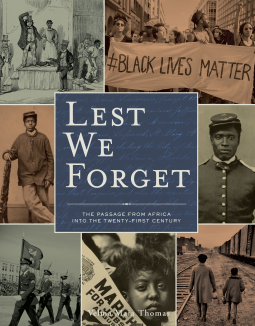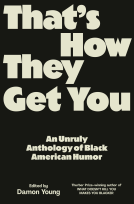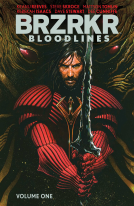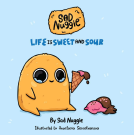
Lest We Forget
The Passage from Africa into the Twenty-First Century
by Velma Maia Thomas
This title was previously available on NetGalley and is now archived.
Send NetGalley books directly to your Kindle or Kindle app
1
To read on a Kindle or Kindle app, please add kindle@netgalley.com as an approved email address to receive files in your Amazon account. Click here for step-by-step instructions.
2
Also find your Kindle email address within your Amazon account, and enter it here.
Pub Date Jan 15 2019 | Archive Date Feb 27 2019
Quarto Publishing Group - becker&mayer! books ISBN | becker&mayer! books ISBN
Talking about this book? Use #LestWeForget #NetGalley. More hashtag tips!
Description
Presented in three parts—Lest We Forget, Freedom’s Children, and We Shall Not Be Moved—the history comes to life through 5 interactive items attached to the pages throughout, along with 10 more pieces of removable memorabilia contained in an envelope at the back.
Lest We Forget. Based on materials from the nationally acclaimed Black Holocaust Exhibit, Lest We Forget documents the plight of an estimated 100 million Africans, from their rich pre-slavery culture to their enslavement in a foreign land. This collection of stirring historic papers, memoirs, personal effects, and photographs presented alongside moving commentary chronicles the unyielding strength of a people who refused to be broken.
Freedom’s Children. Taste the sweetness of freedom and the bitter struggle for equality through the documents that impacted the lives of an entire race. Freedom’s Children vividly presents the heart-wrenching and inspiring account of freedmen and freedwomen during Reconstruction and into the twentieth century.
We Shall Not Be Moved. Throughout the twentieth century, African Americans would trouble the waters of America—agitating, challenging, and defying the status quo. We Shall Not Be Moved chronicles the struggles and triumphs of African Americans leading up to and during the Civil Rights Movement. Feel the strength of those entrenched in the fight for justice up through the twenty-first century in an afterword that includes the election of America's first African American president and the beginning of the #BlackLivesMatter movement.
Make a personal connection with black history as you unfold a receipt for a five-year-old girl sold for one cent, hold a freed slave's manumission papers, flip through a deposit book for a savings account at the Freedman's Savings and Trust Company, read a letter home from one of the first black army nurses sent overseas during WWII, and open a list of rules for lunch counter sit-ins distributed by a Nashville student in 1960. A foldout timeline gives a chronology of the African American history and experience. The additional removable replica artifacts allow you to hold in your hand:
- Rosa Parks's fingerprints
- A slave receipt
- FBI poster for one of the most high-profile cases of the civil rights movement
- A telegram to the White House from famed baseball player and activist Jackie Robinson
- A newspaper from 1857
- A Black Panther Party poster
- And more
With this richly designed and illustrated book, take an intimate, tangible, and unforgettable journey through more than 400 years of black history.
Marketing Plan
Focus on pushing for Black History Month (February)
Pitch to Black interest media: Ebony (circ. 1 million), Essence (circ. 1 million), Black Enterprise Magazine (circ. 502K), African-American News & Issues (circ. 200K)the Root (4 million uvm)
Pitch to History media: Smithsonian (circ. 1 million), The Atlantic (circ. 572K), AFAR Magazine (circ. 286K), History Online (10 million uvm), American History Online (433K uvm), HistoryNet (433K uvm)
Available Editions
| EDITION | Other Format |
| ISBN | 9780760363829 |
| PRICE | $40.00 (USD) |
Featured Reviews
Thomas’ nonfiction book is filled with photographs, primary documents, and first-hand accounts of African-American history in the United States. In the first section, readers are introduced to the slave trade industry and the struggle for freedom. In addition to the standard academic topics such as slave ships and auctions, Thomas included a short section on slavery through the eyes of a child.
The second section covers emancipation through African-American migration in the US. Again, Thomas focused on standard academic offerings, but also included brief segments on the role of religion during this time and lesser known Western trailblazers such as Mary Fields and Bill Pickett.
The third section focuses on modern struggles and concludes with the 1995 Million Man March. An afterward brings the struggle more current with mentions of President Obama and Black Lives Matter.
For me, the first and second sections were much more interesting and informative than the third section. Discussing race relations and social history is, by its very nature, a charged topic and while there are many things presented in the third section that I disagree with, the overall book is a great look into African American history. I loved the 200+ photographs and documents shown in the book.
The book is marketed as a Biography/Memoir and History. While younger readers would gain much from the first section, the overall tone and content of the book is written for the teen and adult market. It would serve as a great reference for high school students.
Thank you NetGalley and Quarto Publishing for the opportunity to read an advance reader copy.
Lest We Forget gives a raw view of the history of enslaved Africans and the processes they endured to become slaves. This book fills in the many holes left by historians that wouldn't allow the clear facts of the many atrocities committed to be passed down through history.
This book takes you on a journey from pre-colonization to slave-trade to civil war to emancipation and to the civil rights era. These are the true accounts of the toll of 300+ years of stolen history and identity.
This was a hard read, but it was also very enlightening. After reading this, I can't help but wonder at what affluence would be flowing from Africa instead of the poverty and destruction left in the wake of slave trade and European greed.
I highly recommend this read to anyone.
 Reviewer 301937
Reviewer 301937
This book is more than just about history or black history. It's an ode to the black struggle in America and all it encompassed.
I have to say that one of the things that made me want to read it was the fact that for the first time I was not being told about slavery from a colonizers country point of view. In countries with a colonialist past, unsavory themes like Slavery and the Discoveries tend to be brushed aside quickly out of common shame and that does a huge disservice to everyone, creating two different realities depending on which point of view your teacher and your government have. This book levels the field a bit.
I did find that it appealed to the reader's feelings a lot, mainly by using the expression "my people" in almost every page which got tiring really quickly but I was content with the way that the book was divided into several short chapters, each one focused on a different decade and theme.
This is the kind of book that is supposed to be held physically, due to all the photos, maps and historical documents that are difficult to read on a screen. The transcripts at the end of the book do provide a chance for you to read the historical documents that were less readable in the middle of the book though.
best to have a physical copu so you can make the most of all the maps, photos and coluns in which the text is organized
I realise that it takes me a while to finish Lest We Forget – a collection of three books by Velma Maia Thomas. No..no..no, it is not because the book is bad or something. It is because I want to make my time and enjoy this book. Anyhow, the book is written beautifully and it rises the voices of those being referred as "black gold"- men, women, children and those who are taken to work as a slave from their origins. Those people who are often being marginalised.
Concerning the book, it is divided into several sections. The first one tells the readers about the beginning of slave-trade and how they live and work. The second one tells about the achievement that the make which they often called as an emancipation. This is sad tho because this chapter tell us that those people are free but they are somehow restricted by the laws and the rules in the society. Meanwhile, the final section brings the readers to the condition in the 20th century into 21st century when they still struggle during the Civil Right movement to the more recent 1995 Million Man March. What I do love about this book is the fact that the author also mentions several prominent Afro-American figures such as Martin Luther King, Dorris Miller, and Nat Turner.
This book comes as a good reference for those who want to know more about the Afro-American movement history. Well, it does not cover it all but it gives the enlightenment and the encouragement. Most important thing of all, it gives those marginalised ones, a voice to finally speak! The battle goes on!
Thanking NetGalley and the publisher for giving me the ARC of the book in exchange of an honest review.
Review: https://www.goodreads.com/review/show/2752800145?book_show_action=false&from_review_page=1
 Vidya T, Reviewer
Vidya T, Reviewer
Lest We Forget – a collection of three books by Velma Maia Thomas – written so that it sounds like an autobiographical (of the people) text book the intended audience will read, yet presented with a raw, heart-wrenching honesty that resonates throughout the book.
From being referred to as “black gold” (men, women, and children who were taken from their home lands by traders to work as slaves) to #BlackLivesMatter, this book covers it all.
The first section introduces the reader to the beginnings of slave-trade, the conditions that slaves lived and worked in, and later towards emancipation.
The second section shows the struggles and the journeys African-Americans undertook after the proclamation of emancipation to make a life for themselves. They were free, but yet not, with many restrictions being placed by laws and rules and society on what they could or could not do.
The final section brings the reader, as it states, through the twentieth century into the twenty-first century. It describes the struggles, the wins, and the losses African Americans went through during the Civil Rights movement, and ends with the more recent Million Man March in 1995.
An afterword includes President Barack Obama and then into today’s presidency with #BlackLivesMatter.
In addition to reading again about people I knew, like Harriet Tubman and Martin Luther King, I was introduced to many lesser known pioneers and heroes , like Mary Fields (the first African-American woman employed as a mail carrier in the United States), Doris Miller (the first African American recipient of the Navy Cross), William Lloyd Garrison(an abolitionist who founded ‘The Liberator’), and Nat Turner(a freedom fighter who led a rebellion).
Rating: 5/5
Reading Level: 12 years and above
Reread Level: 5/5
In Summary:
A must-read and a wonderful resource for high-schoolers and even adults who want to learn more about this history. The transcripts, end-notes, chronology, and image-credits at the end of the book can help the reader further to research and learn more.
Note that the physical book includes interactive elements for the reader to explore. My review is based on a digital review copy.
Disclaimer: Thank you to NetGalley and the publishers for the above book. The opinions expressed are my own.
Very good book with documents and pictures about African American history. Very informative and thought provoking. Thanks to Netgalley, the author and the publisher for the arc of this book in return for my honest review. Receiving the book in this manner had no bearing on my review.


















